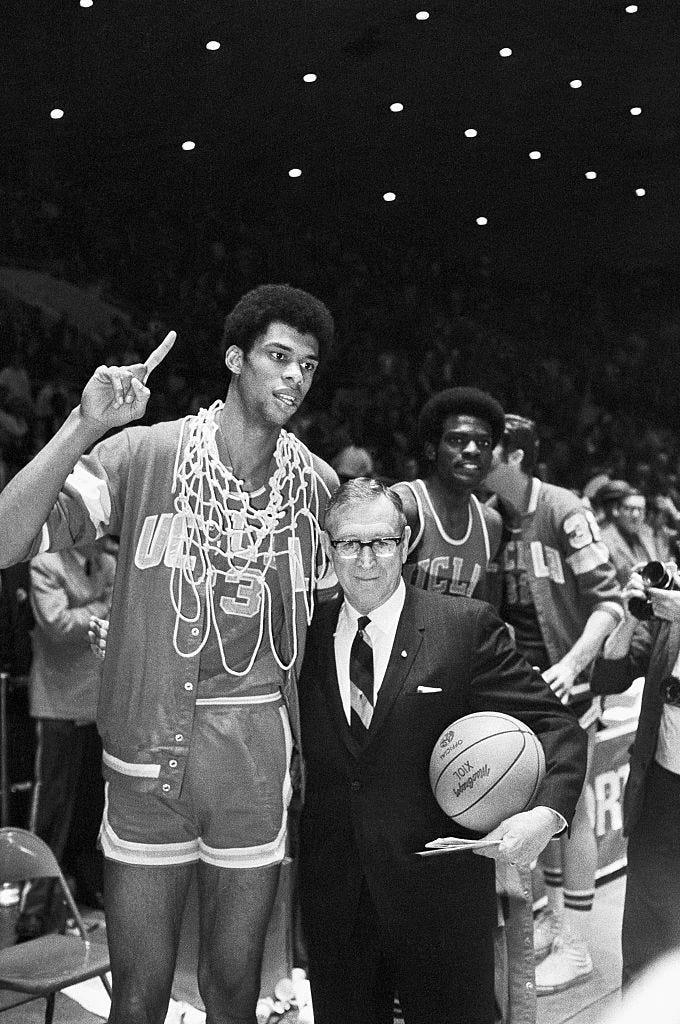What I’m Discussing Today:
Kareem’s Daily Quote: Coach Wooden’s pithy saying about embracing life over work has hidden depths.
Democratic National Convention Draws 20 Million On First Night, Surpassing RNC Viewership: The focus on crowd size and ratings dumbs down the election process and distracts us from the issues.
Trump Xenophobia Reaches Its Apex in Racist Campaign Post: The most racist ad for Trump yet. Proof that the concept of shame is disappearing.
Republicans ask Supreme Court to block 40,000 Arizonans from voting in November: The GOP has decided cheating is the best way to win an election.
Kareem’s Video Break: This video made me like people, mothers, and bears.
Kareem’s Kvetching Korner: Astrology? Really?: About as accurate as a fortune cookie.
What I’m (Re)Watching: TV: In need of good, solid mysteries that are clever and entertaining? I rewatched all seasons of Sherlock and No Offence (British spelling). I’m glad I did.
Keane Sings “Somewhere Only We Know”: This ethereal song transports us to a quiet and safe space where we can be ourselves.
Kareem’s Daily Quote
Do not let making a living prevent you from making a life.
John Wooden, UCLA basketball coach
John Wooden, my UCLA coach and friend of 50 years, had a lot of pithy sayings. Some were original, and some he borrowed from others (like Ben Franklin). But much of what he said to us had the weight of wisdom because we knew that he didn’t just talk the talk, he walked the walk. Whatever he said was also what he practiced. He was a devout and moral man who tried to live up to the high ethical standards he set for himself. We knew that his main objective was to make us good men as well as good players. Actually, being good men was even more important than being good players.
This quote seems simple enough. Something we can all nod agreement with and then go on our merry way. But I think there are deeper layers to its simplicity. It’s not just about taking more time off work to spend with friends and family, it’s also about how we lie to ourselves and others about our priorities. And how those lies prevent us from making a truly fulfilling life.
If you’ve ever watched interviews with people on reality shows, especially ones in which they compete for money, there’s an endless claiming that they’re doing what they’re doing “for my family.” There are variations: “My kids’ college fund.” “To buy a house for my parents.” “To get married.” And so on. It’s irritating to watch these people tearfully use their families like Hollywood props to virtue signal their own selflessness. The lack of self-awareness is staggering. They choose to be away from their families to compete on a show where their chances of winning are slight because they like the media attention. I’m okay with that, but please stop pretending that this is a major act of self-sacrifice rather than a greedy grab for money and fame. People get married, buy houses, and put their kids through college without stranding themselves on an island or leaping forty feet into the water while grabbing a plastic flag.
Some people prefer work to family and, well, to everything else because at work they know exactly what to do and they get instant rewards for completing their tasks. They are rats in a maze that they’ve already figured out looking for that tasty crumb of cheese. It makes them feel in control and useful. Family and friends are more complicated. They have needs that are hard to read, they can be volatile, and the rewards can be long-term rather than instant. In other words, life is chaotic and difficult. Work can be stressful, but it’s predictable. People not so much. People can hide out in their jobs and careers while rebuffing criticism for avoiding family with, “But I’m doing all this for my family.” They wish to portray themselves as virtuous martyrs rather than cringing cowards. Anyone can make a living; making a rewarding life is so much more challenging.
Americans work more hours per week than people in most other countries. More than half of this country works more than 40 hours per week. I understand there are economic needs and that people do want to provide more for their families. That’s what makes finding that balance so difficult. Will your child remember more fondly the iPad you gave them, or the extra hour every day you spent talking to them about their day? Are you really working so hard for their sakes or are you hiding out in your comfort zone of familiar repetition?



